
Half year results for the six months ended 30 June 2018 [PDF]



| Six months ended 30 June | H1 2018 | H1 2017 |
|---|---|---|
| Key financial performance measures | ||
| EBITDA (£ million)(1) | 102 | 121 |
| Underlying earnings (£ million)(2) | 7 | 9 |
| Underlying earnings per share (pence)(2) | 1.6 | 2.2 |
| Interim dividends (pence per share) | 5.6 | 4.9 |
| Net cash from operating activities (£ million) | 112 | 197 |
| Net debt (£ million)(3) | 366 | 372 |
| Statutory accounting measures | ||
| Operating profit/(loss) (£ million) | 12 | (61) |
| Loss before tax (£ million) | (11) | (104) |
| Reported basic loss per share (pence) | (1) | (21) |
 “Drax continues to be at the heart of decarbonising UK energy, securing government support to convert a fourth unit to biomass and piloting a Bioenergy Carbon Capture and Storage project, supporting the UK Government’s carbon capture and storage ambitions.
“Drax continues to be at the heart of decarbonising UK energy, securing government support to convert a fourth unit to biomass and piloting a Bioenergy Carbon Capture and Storage project, supporting the UK Government’s carbon capture and storage ambitions.
“Full year EBITDA expectations remain unchanged. However, first half EBITDA was lower, principally due to two specific generation outages. We made excellent progress with our Pellet Production business, driving down costs while producing at record levels and our B2B Energy Supply business continues to increase customer numbers. We also remain on track with our investment projects: the conversion of a fourth unit to biomass, and the development of our OCGT and coal-to-gas repowering options.
“We remain focused on safe and efficient operations and returns to shareholders and expect to declare a full year dividend of £56 million for 2018.”
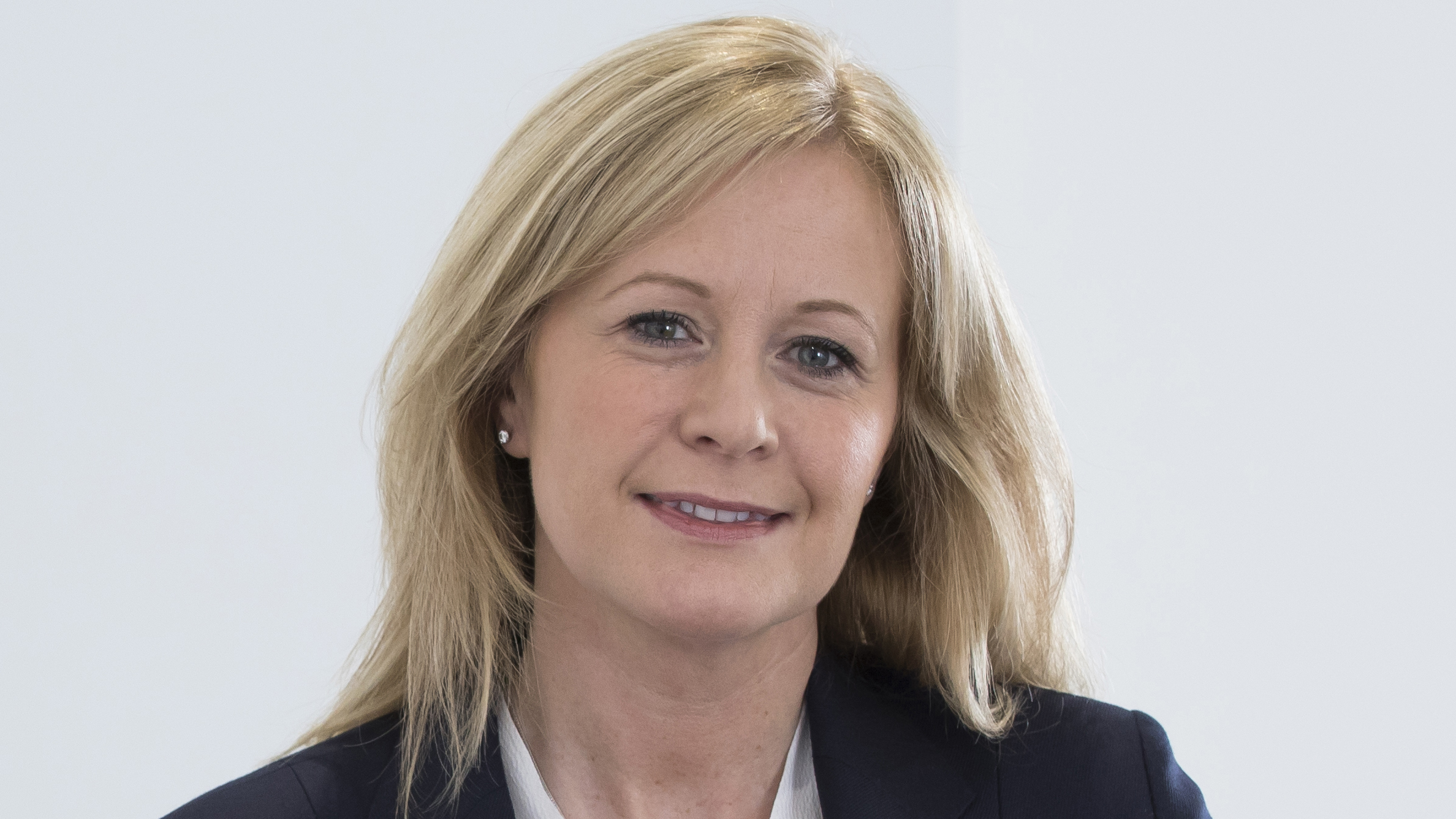
The Board of Drax Group plc (“Drax”) is pleased to announce that Vanessa Simms is to be appointed as a Non-Executive Director, with effect from 19 June 2018.
Vanessa is Chief Financial Officer at Grainger plc (1) and has a strong background in listed businesses, with more than 20 years experience working in senior leadership roles at Unite Group plc, SEGRO plc, Stryker Corp and Vodafone Group plc. She has particular expertise in leading and implementing strategic change.
Philip Cox, Chairman of Drax, said: “The directors are delighted to welcome Vanessa to the Board. Her financial and commercial experience from a broad range of companies and industries will provide real value as Drax delivers on its purpose to help change the way energy is generated, supplied and used for a better future.”
Vanessa added: “I’m looking forward to joining the Board of Drax at this key time for sustainable energy in the UK.”
Vanessa has been appointed as a member of the Company’s Audit Committee. She will work closely with the current Audit Chair, David Lindsell, in anticipation of her succeeding David when he steps down in 2019.
She has also been appointed as a member of the Company’s Nomination and Remuneration committees.
Drax Investor Relations: Mark Strafford
+44 (0) 1757 612 491
Drax Media Relations: Ali Lewis
+44 (0) 1757 612 165
Website: www.drax.com
END

In 2017 we made significant progress with the strategy we announced in December 2016.
First, we completed the acquisition of Opus Energy – a leading challenger brand in the UK Small and Medium-sized Enterprise (SME) energy market; second, we acquired a third biomass pellet plant (LaSalle Bioenergy), which significantly increases our pellet production capacity; and third, we continued to develop options for flexible gas generation at four sites around the UK.
We also began developing longer-term options for growth, with the exploration of coal-to-gas repowering at Drax Power Station, as we look to provide new sources of flexible generation backed up by long-term capacity contracts. To support our strategy, we completed a refinancing in May and announced a new dividend policy in June.
At the same time, we have continued to provide a significant amount of the UK’s renewable electricity. With confirmation of Government support for further biomass generation at Drax Power Station we plan to continue our work to develop a low-cost solution for a fourth biomass unit conversion, allowing us to provide even more renewable electricity, whilst supporting system stability at minimum cost to the consumer.
Opus Energy performed well, delivering on the plans we set out at the time of acquisition and, in North America, LaSalle Bioenergy is successfully commissioning. This performance alongside safety, sustainability and expertise in our core markets acts as a strong base from which the business can grow and deliver long-term sustainable value.
We have a major role to play in supporting the UK energy system, as it becomes increasingly ambitious in decarbonising, first the electricity sector and subsequently transport and heating. In doing so, through our flexible, low-carbon and customer- focused approach we aim to deliver higher quality earnings, with a reduction in commodity exposure alongside opportunities for growth.
Our people – employees and contractors – remain a key asset of the business. Their safety remains at the centre of our operational philosophy and we have performed well in this regard, although we continue to work to improve our performance across the Group.

EBITDA in 2017 of £229 million was significantly ahead of 2016 (£140 million).
This increase was principally from producing high levels of renewable power from sustainable biomass. We also benefited from our growing B2B Energy Supply and Pellet Production businesses. Through these activities we are improving the visibility of our earnings.
In June we announced a new dividend policy. This policy is to pay a dividend which is sustainable and expected to grow as the implementation of the strategy generates an increasing proportion of stable earnings and cash flows. In determining the rate of growth in dividends the Board will take account of contracted cash flows, the less predictable cash flows from the Group’s commodity based business and future investment opportunities. If there is a build-up of capital the Board will consider the most appropriate mechanism to return this to shareholders.
At the 2017 half year results we confirmed an interim dividend of £20 million (4.9 pence per share) representing 40% of the full year expected dividend of £50 million (12.3 pence per share) (2016: £10 million, 2.5 pence per share). Accordingly, the Board proposes to pay a final dividend in respect of 2017 of £30 million, equivalent to 7.4 pence per share. In addition, the Board has decided to announce a £50 million share buy-back programme, which will take place during 2018, which is consistent with our capital allocation policy.
In September, Dorothy Thompson CBE announced her intention to stand down as Group Chief Executive Officer (CEO). I would like to thank Dorothy for her enormous contribution to the Group over the last 13 years. During her tenure Dorothy led the transformation of the business and leaves the Group in a strong position with a clear strategy that lays the foundations for further success in a changing energy sector.
Dorothy is succeeded by Will Gardiner, who was previously Group Chief Financial Officer (CFO) and a key architect of the strategy. His appointment follows a thorough review of internal and external candidates and is a natural progression after two years working alongside Dorothy developing a strategy which I am confident will create significant benefits for all Drax’s stakeholders.
A process to appoint a permanent CFO is underway and Den Jones has been appointed as Interim CFO. Den is highly experienced, having previously served as CFO of both Johnson Matthey and BG Group. Drax remains committed to the highest standards of corporate governance. The Board and its committees play an active role in guiding the Company and leading its strategy. We greatly value the contribution made by our Non-Executive Directors (NEDs) and during a time of transition their role is especially important.
We indicated last year that we were seeking additional NEDs with experience in sustainability and energy supply to complement our already experienced Board. I am therefore delighted to welcome two new NEDs to the Drax Board. Firstly, David Nussbaum, whose in-depth knowledge of sustainability will support our continued focus in this area; and secondly, Nicola Hodson, whose experience in technology, business transformation and energy, will provide real value as the Group delivers its strategy.
Sustainability remains at the heart of the business, both the specific sustainability of biomass and more broadly the long-term sustainability of the business. As such I am pleased to note that alongside this year’s annual report and accounts the Group has published a comprehensive overview of our sustainability progress in 2017 on our website.
Full details of our corporate governance can be found on page 64 of the 2017 annual report.
 As the Group grows I would also like to welcome colleagues from Opus Energy and our other developments. On-boarding is proceeding well and by working together in our common goal to help change the way energy is generated, supplied and used, we are creating real value for all stakeholders.
As the Group grows I would also like to welcome colleagues from Opus Energy and our other developments. On-boarding is proceeding well and by working together in our common goal to help change the way energy is generated, supplied and used, we are creating real value for all stakeholders.
I must thank all the employees and contractors who have worked so hard to help the Group succeed in the last 12 months. It is through their skill, expertise and hard work that we are able to deliver our strategy for the business.
My sincere thanks to colleagues for their commitment and hard work.
It only remains for me to say that your Board remains totally committed to the complementary aims of delivering sustainable long-term value for the Group, and of helping our country build a low-carbon economy.

The UK is undergoing an energy revolution – a transition to a low-carbon economy requiring new energy solutions for power generation, heating, transport and the wider economy. Through our flexible, lower carbon electricity proposition and business to business (B2B) energy solutions, the Group is positioning itself for growth in this environment. More details can be seen on page 4 of our annual report.
Our purpose is to help change the way energy is generated, supplied and used.
Through addressing UK energy needs, and those of our customers, our strategy is designed to deliver growing earnings and cash flow, alongside significant cash returns for shareholders.
Our ambition is to grow our EBITDA to over £425 million by 2025, with over a third of those earnings coming from Pellet Production and B2B Energy Supply to create a broader, more balanced earnings profile. We intend to pay a sustainable and growing dividend to shareholders. Progression towards these targets is underpinned by safety, sustainability, operational excellence and expertise in our markets.
We made significant progress during 2017, but were below our expectations on the challenging scorecard targets we set ourselves in pellet production and biomass availability, the latter reflecting the significant incident we experienced on our biomass rail unloading facilities at the end of 2017, which extended into January 2018. Energy Supply performed well with Opus Energy in line with plan and Haven Power exceeding its targets. Through a combination of this performance and the progress of our strategy we have delivered EBITDA of £229 million, significantly ahead of 2016 (£140 million) and with each of our three businesses contributing positive EBITDA for the first time.
The Group scorecard is reported in full in the Remuneration Report (pp. 81-107 of our annual report) and the KPIs are also shown below. They reflect the diversity of our operations and our need to maintain clear focus on delivering operational excellence.
On a statutory basis we recorded a loss of £151 million, which reflects unrealised losses on derivative contracts, previously announced accounting policy on the accelerated depreciation on coal-specific assets as well as amortisation of newly- acquired intangible assets in Opus Energy. We also calculate underlying earnings, a profit after tax of £2.7 million, which excludes the effect of unrealised gains and losses on derivative contracts and, to assess the performance of the Group without the income statement volatility introduced by non-cash fair value adjustments on our portfolio of forward commodity and currency futures contracts.
During the year we refinanced our existing debt facilities, reducing our debt cost. We also confirmed a new dividend policy which will pay a sustainable and growing dividend (£50 million in respect of 2017), consistent with our commitment to a strong balance sheet and our ambitions for growth. At year end our net debt was £91 million below our 2x net debt to EBITDA target, providing additional headroom. There is more detail on our financial performance in the Group Financial Review on page 46 of our annual report.
In the US, our Pellet Production operations recorded year-on-year growth in output of 35%, with our first two plants now producing at full capacity. During the second half of 2017 we also completed the installation of additional capacity enabling our Morehouse and Amite facilities to handle a greater amount of residue material, supporting efforts to produce good quality pellets at the lowest cost.
As part of our target to expand our biomass self-supply capability we completed the acquisition of LaSalle Bioenergy (LaSalle) adding pellet production capacity. LaSalle commenced commissioning in November 2017 and due to its close proximity to our existing US facilities, once complete, will provide further opportunities for supply chain optimisation.
As in 2016, we benefited from the flexibility of self-supply. This often overlooked attribute of our supply chain enables us to manage biomass supply across the Power Generation business’ planned outage season and to benefit from attractively priced biomass cargoes in the short-term spot market.
In Power Generation, we experienced a significant incident on our biomass rail unloading facilities, including a small fire on a section of conveyor. We fully investigated the incident and following repairs over the Christmas period have now recommissioned the facility, with enhanced operating procedures. This is a timely reminder of the combustible nature of biomass and the need for strong controls and processes to protect our people and assets.
Our biomass units continued to produce high levels of renewable electricity from sustainable wood pellets for the UK market – Drax produced 15% of the UK’s renewable electricity – enough to power Sheffield, Leeds, Liverpool and Manchester combined. In doing so, we are making a vital contribution to the UK’s ambitious targets for decarbonisation across electricity generation, heating and transport – an 80% reduction by 2050 vs. 1990 levels.
We benefited from the first year of operation of our third biomass unit under the Contract for Difference (CfD) scheme which provides an index-linked price for the power produced until March 2027. The unit underwent a major planned outage between September and November, with a full programme of works successfully completed.
The flexibility, reliability and scale of our renewable generation, alongside an attractive total system cost, means we are strongly placed to play a long-term role in the UK’s energy mix. To that end we continue to see long-term biomass generation as a key enabler, allowing the UK Government to meet its decarbonisation targets and the system operator to manage the grid.
The UK Government recently confirmed support for further biomass generation at Drax Power Station and we now plan to continue our work to develop a low-cost solution for a fourth biomass unit, allowing us to provide even more renewable electricity, whilst supporting system stability at minimum cost to the consumer.
Our heritage is coal, but our future is flexible lower-carbon electricity. We are making progress with the development of four new standalone OCGT plants situated in eastern England and Wales and our work to develop options for coal-to-gas repowering with battery technologies. If these options would be supported by 15-year capacity market contracts, providing a clear investment signal and extending visibility of contract-based earnings out to the late 2030s.
In B2B Energy Supply, we completed the acquisition of Opus Energy, a supplier of electricity and gas to corporates and small businesses. The transaction completed in February 2017 and Opus Energy has continued to operate successfully within the Group, achieving its targets and making an immediate and significant contribution to profitability. Alongside this good performance we have also implemented the operational steps necessary to realise further operational benefits of the acquisition, and we now source all of Opus’ power and gas internally.
Haven Power delivered a strong performance with the sale of large volumes of electricity to industrial customers. Through our customer focus and efficiencies, margins have improved and the business generated a positive EBITDA for the first time.
Together, our B2B Energy Supply business now has over 375,000 customer meters, making it the fifth largest B2B power supplier in the UK.
We are delivering innovative low-carbon power solutions, with 46% of our energy sold from renewable sources. As the power system transforms, we will be working closely with our customers to help them adapt to a world of more decentralised and decarbonised power. We see this as a significant opportunity for the Group in the medium to long term.
In October 2017 we completed the sale of Billington Bioenergy (BBE) to Aggregated Micro Power Holding (AMPH). Consideration for the transaction was £2.3 million, comprised of £1.6 million of shares in AMPH and £0.7 million of cash.
The sale of BBE is aligned with our strategy to focus on B2B energy supply. However, through our shareholding in AMPH, we will retain an interest in the UK heating market, whilst gaining exposure to the development of small-scale distributed energy assets.
We continue to operate in a changing environment. The full impact of the UK’s decision to leave the EU is still unknown.
The immediate impact on the Group was a weakening of Sterling and an associated increase in the cost of biomass, which is generally denominated in other currencies. Through our utilisation of medium-term foreign exchange hedges the Group protected the cash impact of this weakness. In 2017, Sterling has generally strengthened, and we have been able to extend our hedged position out to 2022 at rates close to those that we saw before Brexit.
In terms of UK energy policy, the Government’s main focus has been on what it sees as unfair treatment of domestic consumers on legacy standard variable tariff (SVT) contracts. SVT are not a common feature of the B2B market. At the microbusiness end of this market, which is closer in size to domestic, most of our customers are on fixed price products and are active in renewing contracts.
The UK Government’s response to its consultation on the cessation of coal generation by 2025 has confirmed an end to non-compliant coal generation by October 2025.
We believe our assets, projects and ability to support our customers’ electricity management will support the Government’s ambition to maintain reliability when coal generation ceases.
Running a resilient, reliable grid is not simply about meeting the power demand on the system; there are also system support services which are essential to its effective operation. As the grid decentralises and becomes dependent on smaller, distributed generation, the number of plants able to provide these services is reducing. Biomass generation, our proposed OCGTs and our repowering project would allow us to meet these needs, but this will not come for free. A reliable, flexible, low-carbon energy system will require the right long-term incentives.
In November 2017, the Government confirmed that the UK will maintain a total carbon price (the combined UK Carbon Price Support – CPS – and the European Union Emissions Trading Scheme – EU ETS) at around the current level. CPS has been the single most effective instrument in reducing the level of carbon emissions in generation and we continue to support the pricing of carbon, a view echoed in a report prepared for the UK Government by the leading academic Professor Dieter Helm.
Against this backdrop we continue to make an important contribution to the UK economy. According to a study published by Oxford Economics in 2016, Drax’s total economic impact – including our supply chain and the wages our employees and suppliers’ employees spend in the wider consumer-economy was £1.7 billion, supporting 18,500 jobs across the UK.
The health, safety and wellbeing of our employees and contractors is vital to the Group, with safety at the centre of our operational philosophy. We also recognise the growing need to support the wellbeing of our employees and their mental health.
During the year we continued to use Total Recordable Injury Rate (TRIR) as our primary KPI in this area. Performance was positive, at 0.27, but we expect this to improve in the coming year.
The incident at our biomass rail unloading facilities in December did not lead to physical injuries but was nonetheless a significant event and caused disruption into 2018.
We consequently launched an incident investigation to ensure our personal and process safety management procedures are robust.
To promote greater awareness around wellbeing we have embedded this in our new people strategy and expect to focus more energy and resources on this important area during 2018.
Strong corporate governance is at the heart of the Group – acting responsibly, doing the right thing and being transparent. As the Group grows the range of sustainability issues we face is widening and recognising the importance of strong corporate governance, we have published a comprehensive overview of our sustainability progress in 2017 on our website. This also highlights future priorities to broaden our approach to sustainability and improved reporting of environment, social and governance (ESG) performance. We have also completed the process which allows us to participate in the UN Global Compact (UNGC) – an international framework which will guide our approach in the areas of human rights, labour, environment and anti-corruption.
During 2017 we published our first statement on the prevention of slavery and human trafficking in compliance with the UK Modern Slavery Act. We have added modern slavery awareness to our programme of regular training for contract managers and reviewed our counterparty due diligence processes.
We have continued to maintain our rigorous and robust approach to biomass sustainability, ensuring the wood pellets we use are sustainable, low-carbon and fully compliant with the UK’s mandatory sustainability standards for biomass. The biomass we use to generate electricity provides a 64% carbon emissions saving against gas, inclusive of supply chain emissions. Our biomass lifecycle carbon emissions are 36g CO2 / MJ, less than half the UK Government’s 79g CO2 / MJ limit.
Our people are a key asset of the business. Through 2017 we developed a new people strategy. The strategy focuses on driving performance and developing talent to deliver the Group’s objectives. We have established Group-wide practices, including a career development and behaviour framework focused on performance and personal development.
A key part of our strategy is to identify opportunities to improve existing operations and create options for long-term growth. To that end we have established a dedicated Research and Innovation (R&I) team led by the Drax engineers who delivered our world-first biomass generation and supply chain solution.
We are actively looking at ways to improve the efficiency of our operations, notably in our biomass supply chain.
Biomass is our largest single cost and as such we are focused on greater supply chain efficiency and the extraction of value from a wide range of low-value residue materials.
In B2B Energy Supply we are using our engineering expertise to help offer our customers value-adding services and products which will improve efficiency and allow them to optimise their energy consumption.
In the following sections we review the performance of our businesses during the year.
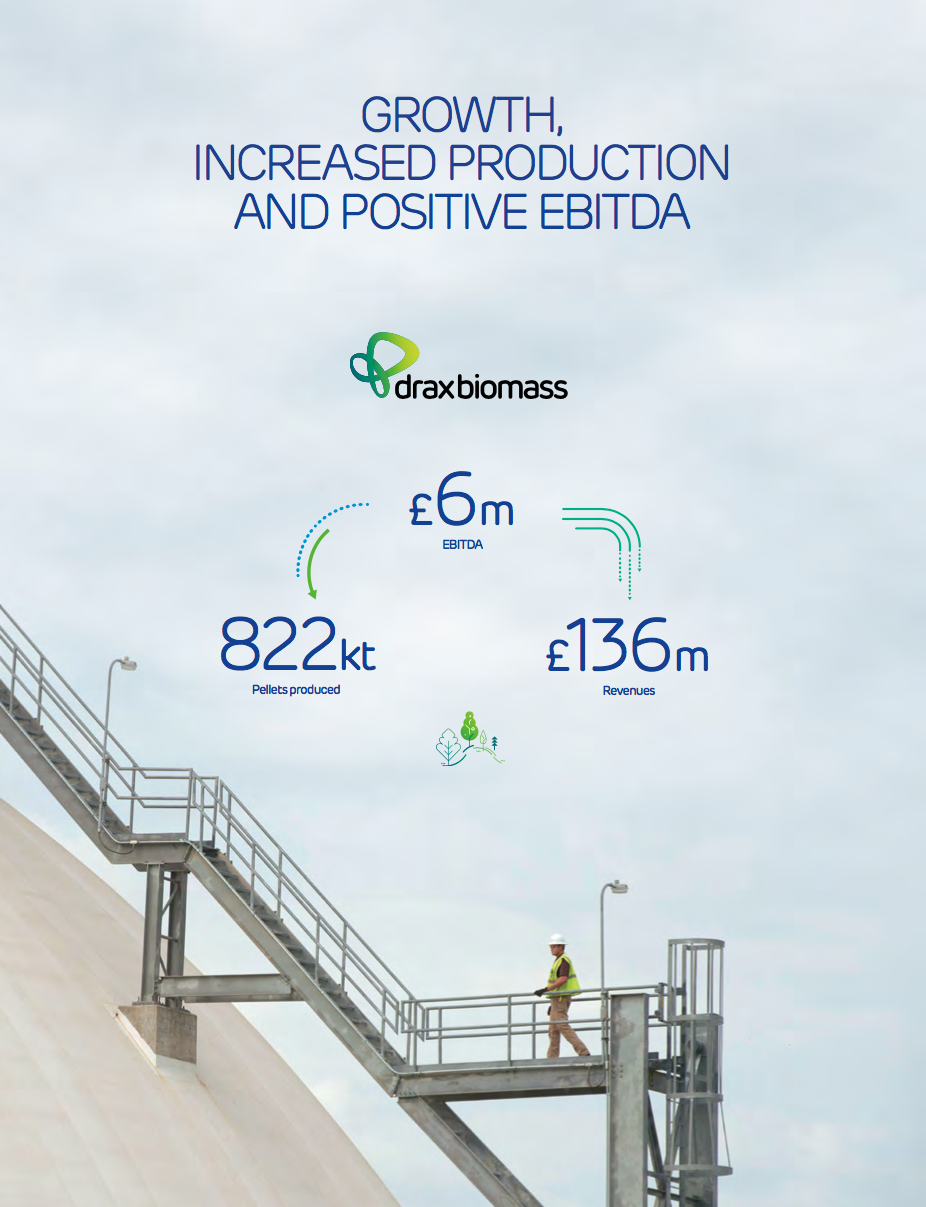
Our pellets provide a sustainable, low-carbon fuel source – one that can be safely and efficiently delivered through our global supply chain and used by Drax’s Power Generation business to make renewable electricity for the UK. Our manufacturing operations also promote forest health by incentivising local landowners to actively manage and reinvest in their forests.
Safety remains our primary concern and we have delivered year-on-year reduction in the level of recordable incidents.
Output at our Amite and Morehouse pellet plants increased significantly, although was below our target for the year.
We have remained focused on opportunities to improve efficiencies and capture cost savings as part of our drive to produce good quality pellets at the lowest possible cost. We still have more work to do in this area to optimise quality and cost, as our performance was below target for the year.
As part of our plans to optimise and improve operations we added 150k tonnes capacity at our existing plants, bringing total installed capacity to 1.1 million tonnes and increasing the amount of lower cost sawmill residues we are able to process and used in our pellets.
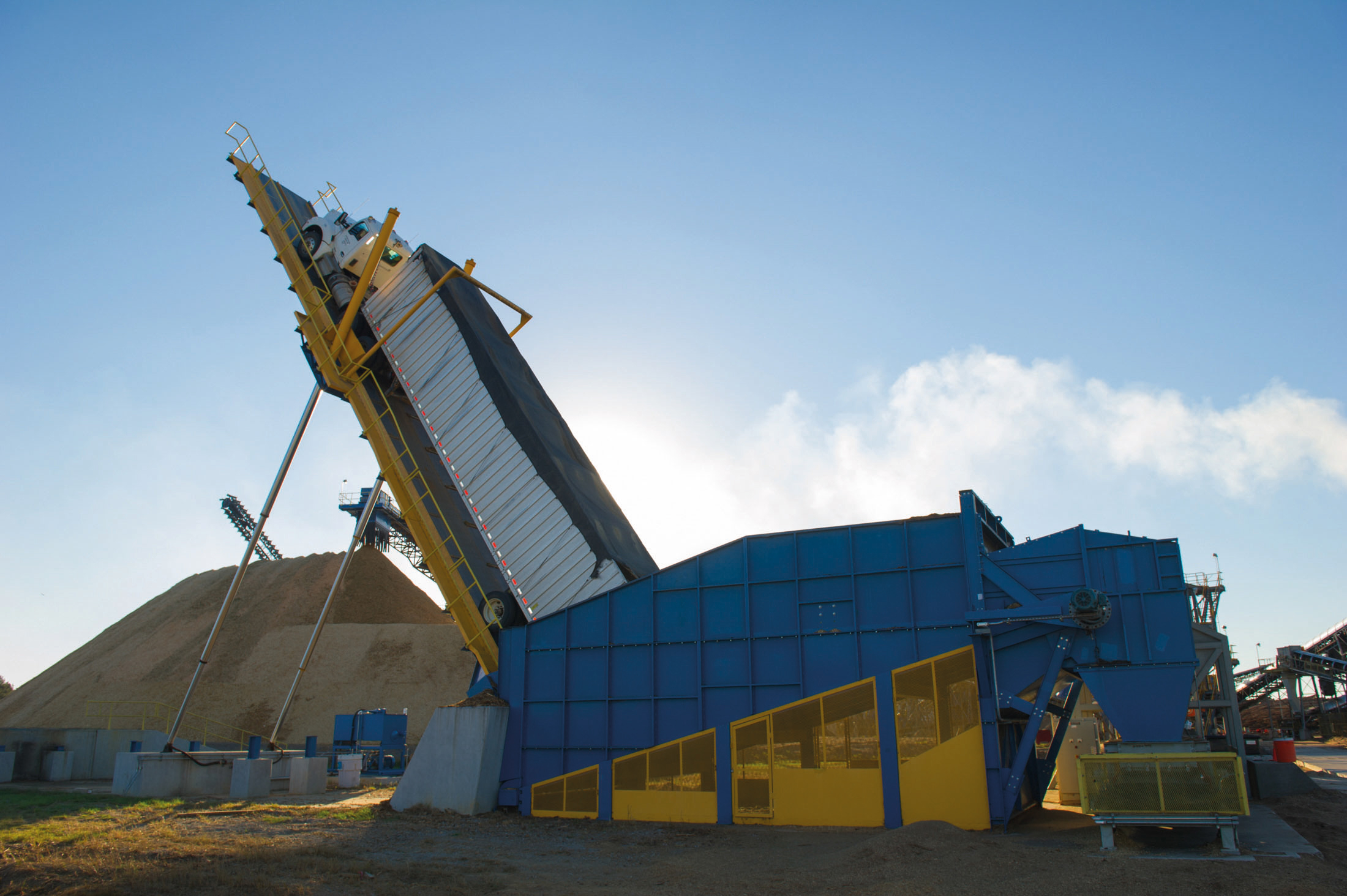
By-products of higher value wood industries, such as sawdust from sawmills, offer a low-cost source of residues for use in our pellet production process and during 2017 we added an additional 150k tonnes of capacity at our pellet plants to allow us to use more of this material. By investing in giant hydraulic platforms known as ‘truck dumps’, operators at Amite and Morehouse can unload a 50-foot truck carrying either sawdust or wood chips and weighing 60 tonnes in less than two minutes, increasing processing capacity, reducing the cost of processing and increasing the use of lower cost residues.
Find out more: www.drax.com/truckdumps and www.drax.com/sustainability/sourcing
At our Baton Rouge port facility greater volumes of production from our facilities drove higher levels of throughput with 17 vessels loaded and dispatched during the year (2016: 11 vessels).
In April, in line with our strategy to increase self-supply, we acquired a 450k tonne wood pellet plant – LaSalle Bioenergy (LaSalle). Commissioning of the plant began in November 2017 and we expect to increase production through 2018. LaSalle is within a 200-mile radius of our existing facilities. By leveraging the locational benefits of these assets we aim to deliver further operational and financial efficiencies.
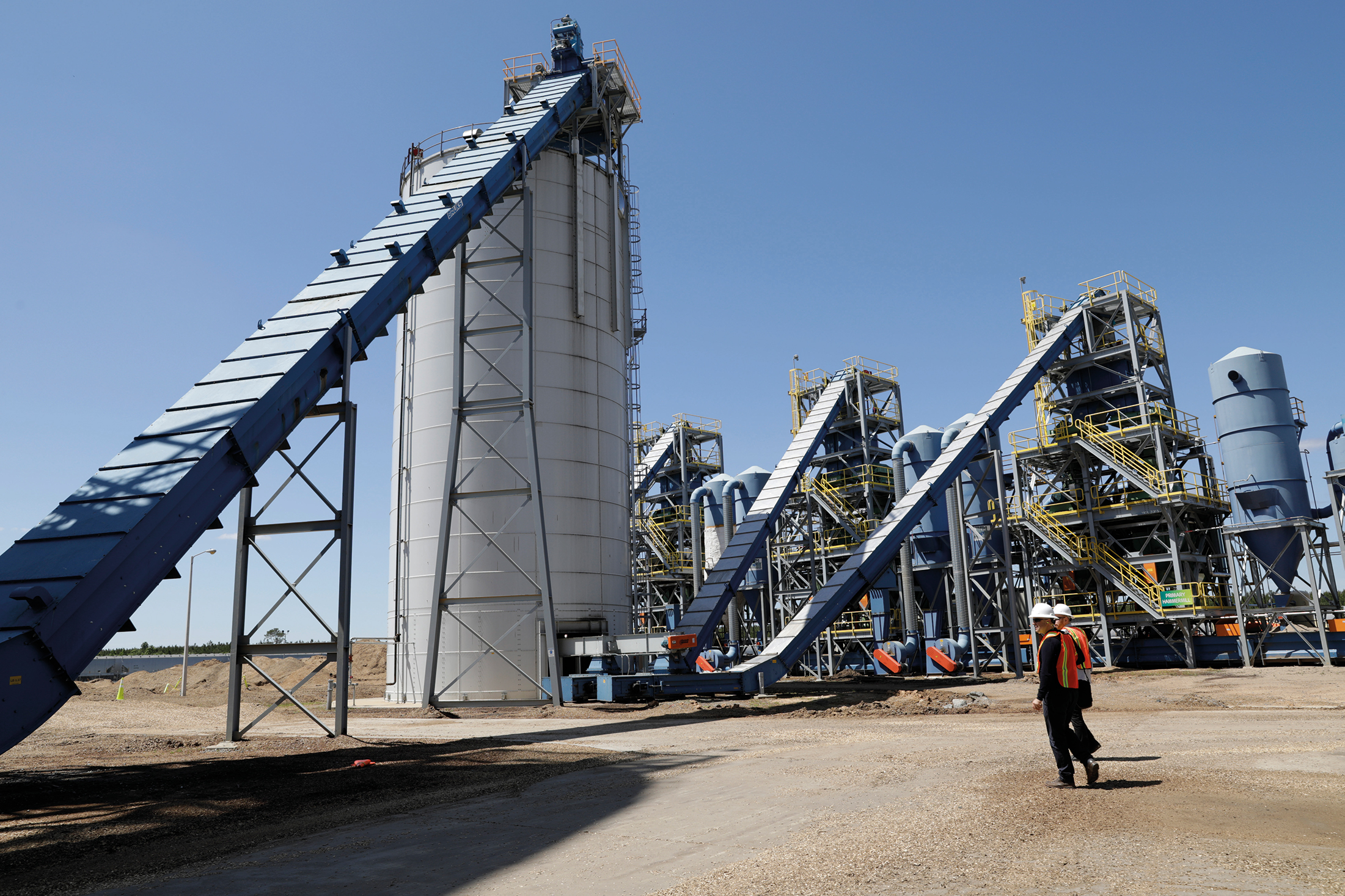
The location of our operations allows us to leverage benefits of multiple assets and locations for operational efficiencies
All sites within 200-mile radius
Operational efficiencies
Shared logistics to Baton Rouge
Complementary fibre sourcing
Find out more: www.draxbiomass.com
There was a significant improvement in 2017, with EBITDA of £5.5 million (2016: £6.3 million negative EBITDA), driven by increasing volumes of wood pellets produced and sold to the Power Generation business. Sales of pellets in the year ending 31 December 2017 totalled £136 million, an increase of 84% over 2016.
Gross margin increased, reflecting higher production volumes. Raw fibre procurement, transportation and processing comprised the majority of cost of sales and as such this remains an important area of focus and an opportunity for the business. Through incremental investment in plant enhancements we expect to see further benefits from efficiencies and greater utilisation of lower cost residues.
Total operating costs have increased, reflecting an increase in operations at Amite, Morehouse and the Port of Baton Rouge, alongside the addition of LaSalle.
We acquired LaSalle for $35 million and have invested an additional $27 million as part of a programme to return the unit to service.
| 2017 £m | 2016 £m |
|
|---|---|---|
| Revenue | 135.7 | 73.6 |
| Cost of sales | (96.7) | (55.5) |
| Gross profit | 39.0 | 18.1 |
| Operating costs | (33.5) | (24.4) |
| EBITDA | 5.5 | (6.3) |
| Area | KPI | Unit of measure | 2017 | 2016 |
|---|---|---|---|---|
| Operations | Fines at disport | % | 9.6 | 7.6 |
| Operations | Output | ,000 tonnes | 822 | 607 |
| Financial | Variable cost/tonne | $/tonne | 77 | 82 |
Through 2018 we expect to continue to deliver growth in EBITDA from our existing assets. Our focus is on the commissioning of LaSalle alongside opportunities for optimisation and efficiencies in our processes, to deliver good quality pellets at the lowest cost.
We remain alert to market opportunities to develop further capacity as part of our self-supply strategy.
Drax Power Station remains the largest power station in the UK (almost twice the size of the next largest). During the year the station met 6% of the UK’s electricity needs, whilst providing 15% of its renewable electricity, alongside important system support services.
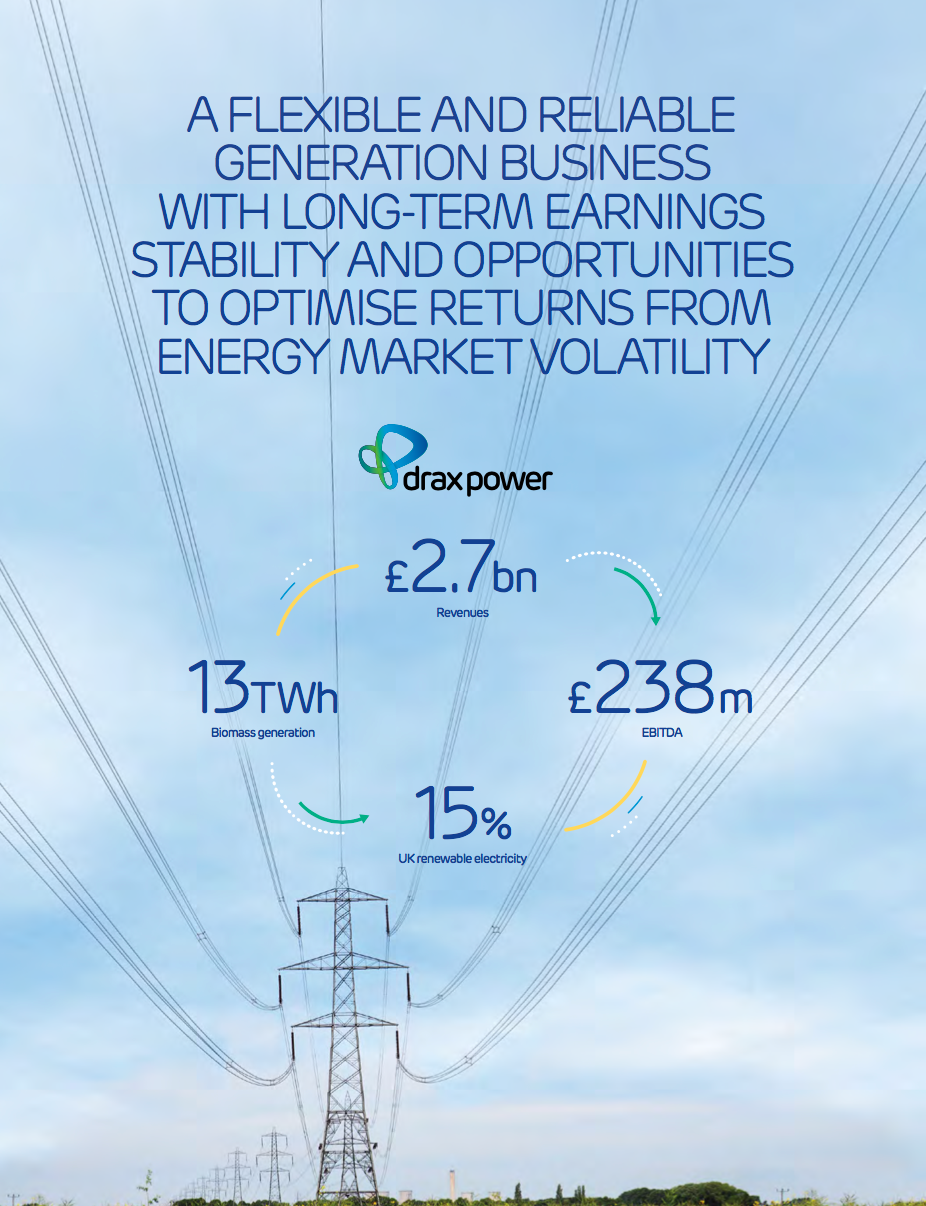
With an increase in intermittent renewables and a reduction in the responsive thermal generation historically provided by coal, the system of the future will require capacity which is reliable, flexible and able to respond quickly to changes in system demand and provide system support services. These long-term needs inform our biomass generation and the development of options for investment in gas – Open Cycle Gas Turbines (OCGTs) and coal-to-gas repowering.
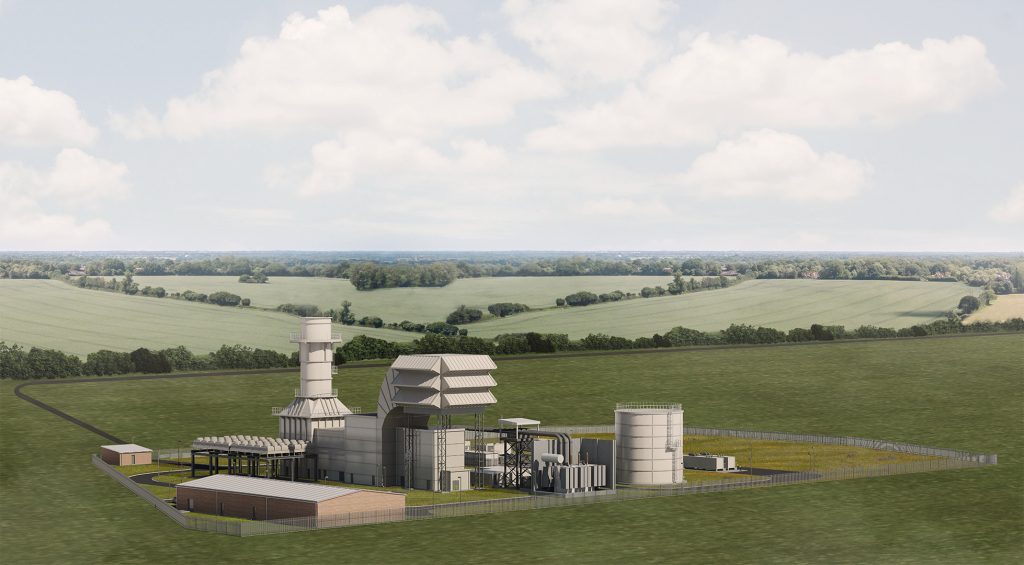
We are developing options for four new OCGT gas power stations, two of which already have planning permission and could be on the system in the early 2020s, subject to being awarded a capacity agreement.
A high-tech new control room at Drax Power Station will allow engineers to have real time remote control of our OCGT assets via a fibre-optic cable network. Able to fire up from cold and produce power in minutes rather than hours, our OCGTs will help maintain system security as intermittent renewable sources of power increase and older thermal plants close.
Investment case
Find out more: www.drax.com/about-us/#our-projects
In October the Government published its Clean Growth Plan, setting out its plans for delivery of its legally binding target to reduce 2050 carbon emissions by 80% versus 1990 levels across electricity generation, heating and transport. This reinforces the Drax proposition – flexible, reliable, low-carbon electricity.
In November the Government updated its intentions regarding the future trajectory of UK Carbon Price Support (CPS), indicating that the total cost of carbon tax in the UK (the total of CPS and the EU Emissions Trading Scheme) would continue at around the current level (the tax is currently set at £18/tonne) whilst coal remains on the system.
We believe that CPS has been the single most effective instrument in reducing carbon emissions from generation and that having an appropriate price for carbon emissions is the right way to provide a market signal to further reduce emissions in support of the UK’s long-term decarbonisation targets.
The UK Government has now confirmed an end to non-compliant coal generation by 2025. We support this move subject to an appropriate alternative technology being in place. With this in mind we have continued to develop options for our remaining coal assets to convert to biomass or gas, to provide the reliable, flexible capacity which we believe will be required to manage the increasingly volatile energy system of the future.
Most recently with confirmation of Government support for further biomass generation at Drax Power Station we plan to continue our work to develop a low-cost solution for a fourth biomass unit, accelerating the removal of coal-fired generation from the UK electricity system, whilst supporting security of supply.
2017 saw the first full year of operation of our biomass unit under the Contract for Difference (CfD) mechanism, which provides index-linked revenues for renewable electricity out to 2027.
Our other biomass units are supported by the Renewable Obligation Certificate (ROC) mechanism which, similar to the CfD, is also index-linked to 2027. This acts as a premium above the price of power we sell from these units. We sell power forward to the extent there is liquidity in the power markets which, combined with our fuel hedging strategy, provides long-term earnings and revenue visibility.
Lower gas prices, higher carbon costs and the continued penetration of intermittent renewables have kept wholesale electricity prices subdued.
With increasing levels of intermittent renewables we are continuing to see opportunities to extract value from flexibility – short-term power and balancing market activity, the provision of Ancillary Services and the value achieved from out-of-specification fuels. To capture value in this market we continue to focus resource on optimising availability and flexibility of both coal and biomass units. This whole process requires a high level of teamwork between the operational and commercial teams across the Group to capture and protect value.
Over the period 2017 to 2022 we expect to earn £90 million from a series of one-year capacity market contracts for our coal units, demonstrating that they still have a role to play. The first of these contracts commenced in October 2017, adding £3 million to EBITDA.
Lastly, we continue to source attractively priced fuel cargoes – out-of-specification coals and distressed cargoes, which help keep costs down for the business and consumers. We do this for both coal and biomass. This is a good example of how our commercial and operational teams work together to identify opportunities to create value for the business, as these fuels typically require more complex handling processes.
You can follow the market and see prices at electricinsights.co.uk
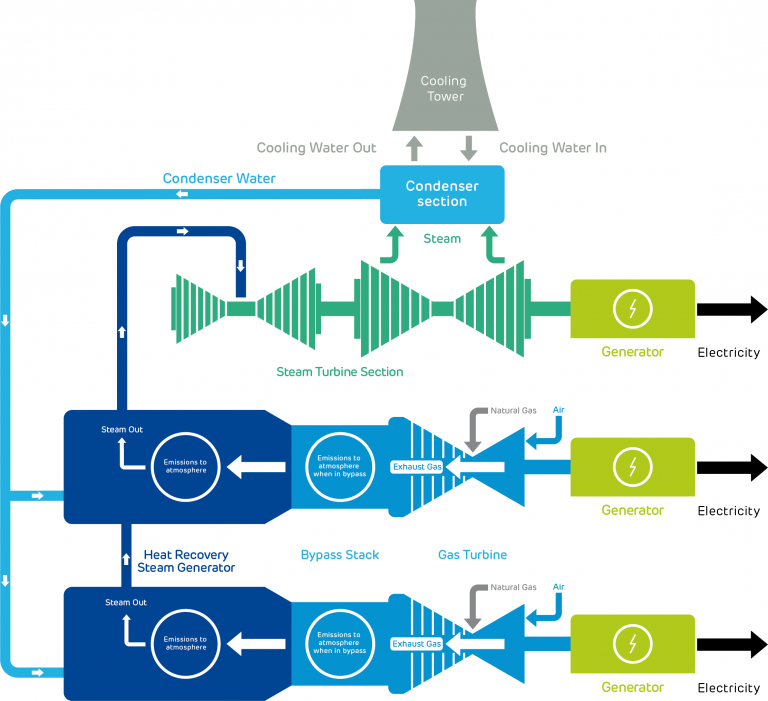
Options for Drax Power Station to operate into the late 2030s and beyond moved up a gear in 2017 with the development of an option to repower two coal units to gas. Drax gave notice of the nationally significant infrastructure project to the Planning Inspectorate in September 2017. One of the units could be eligible for the capacity market auction planned for December 2019.
Local community consultations began in November 2017 and continued in February 2018 on options including up to 3.6GW of new gas generation capacity, a gas pipeline and 200MW of battery storage in line with Government plans to end non-compliant coal generation by 2025 and Drax Group’s strategy of playing a vital role in the future energy system.
Find out more: repower.drax.com
Overall, we delivered a good performance during 2017 and maintained a strong safety performance.
We completed a major planned outage on the unit supported by the CfD contract. This unit provides stable and reliable baseload renewable electricity to the network and long-term earnings visibility for the Group. The safe and efficient completion of these complex works is a credit to those involved and reflects our continued focus on opportunities for improvement and efficiencies.
The entire organisation has responded to a number of challenging unplanned events. Most notably, in December we experienced a fire on a section of conveyor at our biomass rail unloading facility and consequently an unplanned outage from late December 2017 to mid-January 2018. Following investigation and recommissioning, the facility has returned to service with enhanced operating procedures. Although this issue did not relate to the operation of the biomass-generating units, the resulting restriction on fuel deliveries by rail required the optimisation of generation across our biomass units, resulting in lower EBITDA and full year biomass availability than our target for the year.
Financial performance has significantly improved, with EBITDA of £238 million (2016: £174 million), principally due to the CfD mechanism.
Value from flexibility was below our target for the year, principally reflecting a lower level of Ancillary Service payments versus 2016.
Our operational performance drives the results. The financial impact of the unplanned outage on the rail unloading facility was mitigated by optimisation of our available biomass and the use of additional generation capacity retained for self-insurance purposes. However, this incident is a reminder of the need to invest appropriately to maintain a high level of operational availability and flexibility.
At the operating cost level, we have reduced costs reflecting the efficient single outage and our focus on the implementation of lean management techniques.
| 2017 £m | 2016 £m |
|
|---|---|---|
| Revenue | 2,719.6 | 2,490.9 |
| Cost of power purchases | (891.2) | (904.4) |
| Grid charges | (62.9) | (69.4) |
| Fuel and other costs | (1,367.1) | (1,180.1) |
| Cost of sales | (2,321.2) | (2,153.9) |
| Gross profit | 398.4 | 337.0 |
| Operating costs | (160.9) | (163.2) |
| EBITDA | 237.5 | 173.8 |
| Area | KPI | Unit of measure | 2017 | 2016 |
|---|---|---|---|---|
| Operations | Biomass unit technical availability | % | Below target | Below target |
| Operations | Value from flexibility | £m | 88 | N/A |
We aim to optimise returns from our core assets, through reliable, flexible, low-carbon energy solutions which provide a long-term solution to the UK’s energy needs. Alongside this, value in the generation market will be created from an ability to execute agile decisions and capture value from volatile short-term power markets.
We will also continue to explore opportunities for lower carbon generation, to exploit our strengths and create opportunities for the long term. To that end we will continue to develop options for gas and pursue efficiencies through our biomass supply chain.
Our B2B Energy Supply business – comprised of Opus Energy and Haven Power – is the fifth largest B2B power supplier in the UK. As the power system transforms, we will be working closely with our customers to help them adapt to a world of more decentralised and decarbonised power. The key factors influencing our business are regulation, competition and our operational performance.
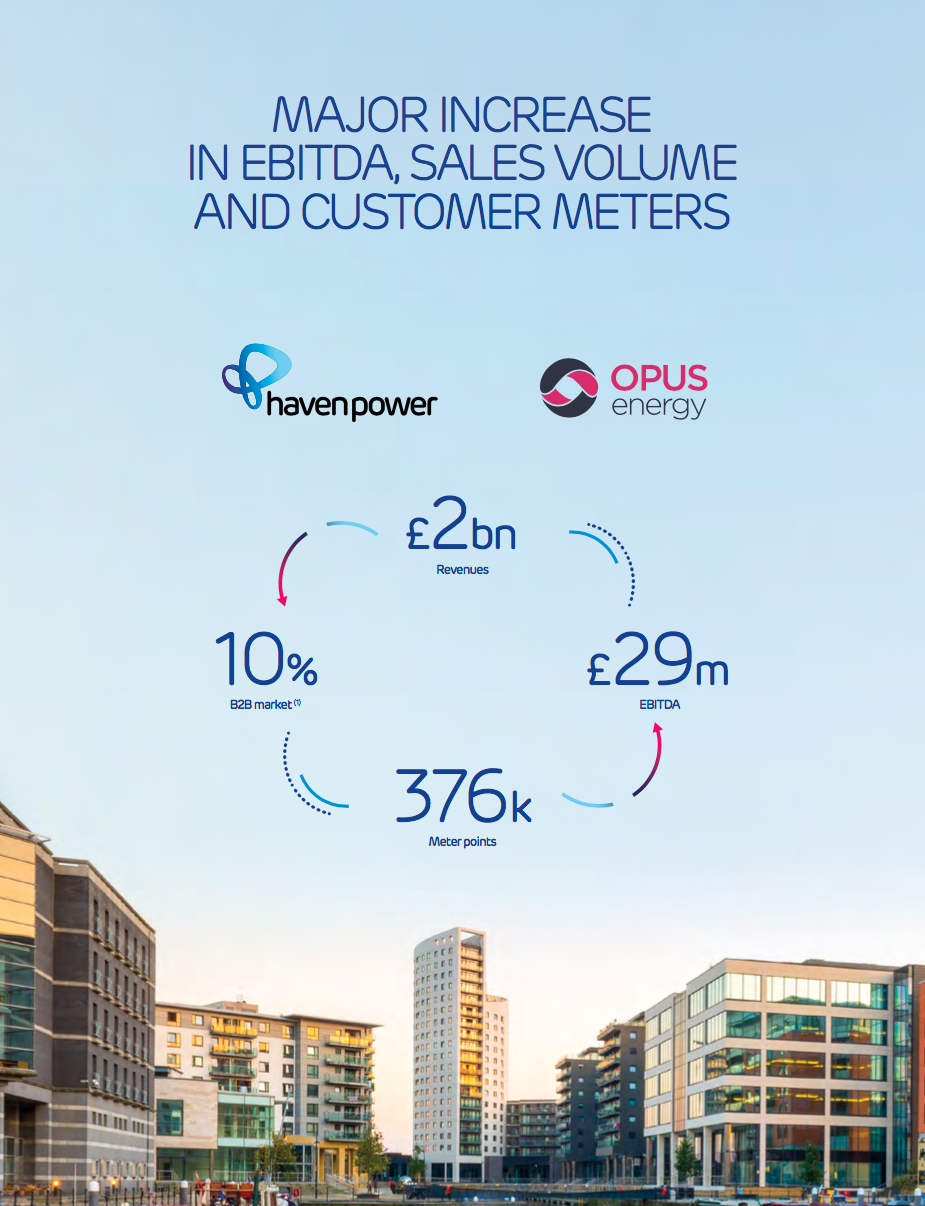
The UK Government’s main focus has been on what it sees as unfair treatment of domestic consumers on legacy standard variable tariff (SVT) contracts. The Government will take forward legislation which will provide the regulator Ofgem with the authority to cap these domestic tariffs. SVTs are not a feature of our business. Our focus remains on the B2B market. At the microbusiness end of the market, which is closer in proximity to domestic, most of our customers are on fixed price products and are actively rather than passively renewing their power supply contracts.
The B2B market remains competitive with 65 different suppliers across the market. Our Haven Power and Opus Energy businesses offer customer-centric power, gas and services. We offer simplicity and flexibility across our products and actively engage with customers to help them manage their energy requirements and reduce carbon emissions.

90% of the electricity that Opus Energy supplied last year came from clean, renewable sources, at no extra cost to their predominantly small and medium-sized business customers. For those customers who want it, 100% renewable energy contracts are also available.
This was exactly what All Saints Church in Ascot was looking for to power their business.
Assistant Church Warden, Chris Gunton, commented:
“We wanted to move to a greener energy supplier, without paying a premium, so approached an energy broker for guidance. They advised us that Opus Energy were a reliable company with a good reputation, and when we asked for a quote they were the most competitive.”
It was a similar story for the Salisbury Museum, in Wiltshire. Nicola Kilgour-Croft, Finance Manager, said:
“We were looking for an energy supplier that offered great value, combined with the right length of contract and good ethics. Opus Energy ticked all these boxes for us.”
Alongside supplying customers, Opus Energy has Power Purchase Agreements with over 2,300 independent UK renewable energy generators. These could be anything from a single wind turbine owned by a village community, to Europe’s greenest zoo, Hamerton Zoo Park.
Commented Andrew Swales, Director of Hamerton Zoo:
“Working with Opus Energy has given us competitive prices, considerably better documentation and a highly efficient service. We’d happily recommend them.”
We have remained focused on delivering an excellent standard of customer service, which is central to our proposition.
February 2017 saw the completion of the acquisition of Opus Energy, which has made good progress integrating into the Group supported by a dedicated team, who have been working on systems, people and commercial projects to ensure our processes work effectively together.
In March we completed the purchase of a new office facility in Northampton, enabling the consolidation of four Opus Energy offices into one and the centralisation of the operational teams.
Sales volumes at Opus Energy were lower than target, reflecting our focus on margin which has remained strong and customer renewal rates were towards the high end of expectation. This reflects the continued commitment to a strong level of customer service and in recognition of this Opus Energy was awarded Utility Provider to Small Businesses of the Year 2017 at the British Business Awards.
At Haven Power we have continued to focus on value-adding flexible products and services particularly to Industrial & Commercial customers whose needs extend beyond commodity supply.
This is demonstrated through our ability to help customers manage and optimise their power consumption profiles through collaboration with our carefully selected partners. Through better systems and services, customer targeting and a keener focus on cost to serve we are driving efficiencies and improved margin at Haven Power.
Following the acquisition of Opus Energy the major Enterprise Resource Platform (ERP) system upgrade was re-planned which has led to a revised timeline from Q2 2018 onwards.
We continue to actively manage credit risk by assessing the financial strength of customers and applying rigorous credit management processes, with a strong focus continuing to be placed on billing and cash collection.
Health and safety remains an area of focus for the business and we continue to target a reduction in the level of recordable incidents.
Financial performance has significantly improved, with EBITDA of £29 million in line with our guidance (2016: £4 million negative). This was principally due to the acquisition of Opus Energy, which added 10 months of EBITDA, but also improved financial performance from Haven Power, which was ahead of plan.
Third Party Costs (TPCs) include grid charges, the cost of meeting our obligations under the Renewable Obligation (RO) and small-scale Feed-in-Tariff schemes. Grid charges include distribution, transmission and system balancing costs. TPCs have continued to increase and now account for 50% of revenue.
Total operating costs have risen with the acquisition of Opus Energy. We remain confident that over time the benefits of common platforms and knowledge sharing will lead to efficiencies.
| 2017 £m | 2016 £m |
|
|---|---|---|
| Revenue | 1,999.0 | 1,326.4 |
| Cost of power purchases | (883.7) | (688.9) |
| Grid charges | (435.8) | (310.4) |
| Other retail costs | (562.1) | (303.6) |
| Cost of sales | (1,881.6) | (1,302.9) |
| Gross profit | 117.4 | 23.5 |
| Operating costs | (88.0) | (27.8) |
| EBITDA | 29.4 | (4.3) |
| Area | KPI | Unit of measure | 2017 | 2016 |
|---|---|---|---|---|
| Operations | Implementation of new ERP (Haven Power) | Date | Q2 2018 | N/A |
| Operations | Sales volume (Opus Energy) | TWh | 5.7 | N/A |
| Operations | Renewal rate (Opus Energy) | % | Above Target | N/A |
In 2018 we will focus on Opus Energy on-boarding, systems development and the roll out of smart meters.
We continue to see opportunities for EBITDA growth in the B2B markets, which we will deliver through our customer-focused supply proposition.
Our focus in 2018 remains on the delivery of our strategy and long-term ambitions for earnings growth, underpinned by safety, sustainability, operational excellence and expertise in our markets. We also recognise that being the most efficient operator in each of our markets is a key factor in our success.
Our objective in Pellet Production remains the commissioning of LaSalle, the production of good quality pellets at the lowest cost, cross-supply chain optimisation and identifying attractive options to increase self-supply.
Our biomass proposition is strong – reliable, flexible, low-carbon renewable electricity and system support which, combined with an effective fuel hedging strategy, will provide long-term earnings visibility. We remain focused on ways to increase supply chain efficiency and make biomass competitive beyond 2027. As part of this we remain focused on the optimisation of our assets in the US Gulf and reduction in pellet cost. To support this focus we are moving our US headquarters from Atlanta to Monroe, Louisiana, which benefits from a much closer proximity to these assets.
In Power Generation, we continue to explore ways to optimise our existing operations, whilst meeting the needs of the changing UK electricity system.
We remain supportive of the UK Government’s decarbonisation targets and will continue our work to deliver four OCGTs and a low-cost biomass unit conversion utilising existing infrastructure at Drax Power Station, alongside developing the option to repowering the remaining coal units to gas.
In B2B Energy Supply, we will continue to grow our B2B offering, with significant opportunities to grow market share. At the same time, we will invest in supporting infrastructure to ensure we can continue to grow, offer market-leading digital propositions and smart metering services.
Pellet Production
Power Generation
B2B Energy Supply

We have made good progress on the delivery of our strategy and will continue to build on this as we progress our targets for 2025, whilst playing an important role in our markets and helping to change the way energy is generated, supplied and used.

We continued to transform the business in 2017, delivering a strong EBITDA performance, in line with expectations. This was delivered by all parts of the business making positive contributions for the first time.
We also made good progress delivering our strategy, which is clear and unchanged. We are increasing biomass self-supply, developing projects to diversify our generation mix and growing our B2B energy supply business.
The UK is undergoing an energy revolution, starting with a significant reduction in carbon emissions, and to support that we are helping to change the way energy is generated, supplied and used.

| Twelve months ended 31 December | 2017 | 2016 |
|---|---|---|
| Key financial performance measures | ||
| EBITDA (£ million)(1) | 229 | 140 |
| Underlying profit after tax (£ million)(2) | 3 | 21 |
| Underlying earnings per share (pence)(2) | 0.7 | 5.0 |
| Total dividends (pence per share) | 12.3 | 2.5 |
| Net cash from operating activities (£ million) | 315 | 191 |
| Net debt (£ million)(3) | 367 | 93 |
| Statutory accounting measures | ||
| (Loss) / profit before tax (£ million) | (183) | 197 |
| Reported basic (loss) / earnings per share (pence) | (37.2) | 47.7 |
“We continued to transform the business in 2017, delivering a strong EBITDA performance, in line with expectations. This was delivered by all parts of the business making positive contributions for the first time.
“We also made good progress delivering our strategy, which is clear and unchanged. We are increasing biomass self-supply, developing projects to diversify our generation mix and growing our B2B energy supply business.
“The UK is undergoing an energy revolution, starting with a significant reduction in carbon emissions, and to support that we are helping to change the way energy is generated, supplied and used.”
Pellet Production – Focus on good quality pellets at lowest cost
Power Generation – Focus on optimisation of existing assets and development of projects
B2B Energy Supply – Profitable business with growth in sales and customer meters
(1) EBITDA is defined as earnings before interest, tax, depreciation, amortisation and material one-off items that do not reflect the underlying trading performance of the business.
(2) 2017 underlying earnings exclude unrealised losses on derivative contracts of £156 million and material one-off items that do not reflect the underlying performance of the business (2016: unrealised gains of £177 million).
(3) Borrowings less cash and cash equivalents.
(4) Open Cycle Gas Turbine.
Enquiries:
Drax Investor Relations: Mark Strafford
+44 (0) 1757 612 491
Media:
Drax External Communications: Ali Lewis
+44 (0) 1757 612 165
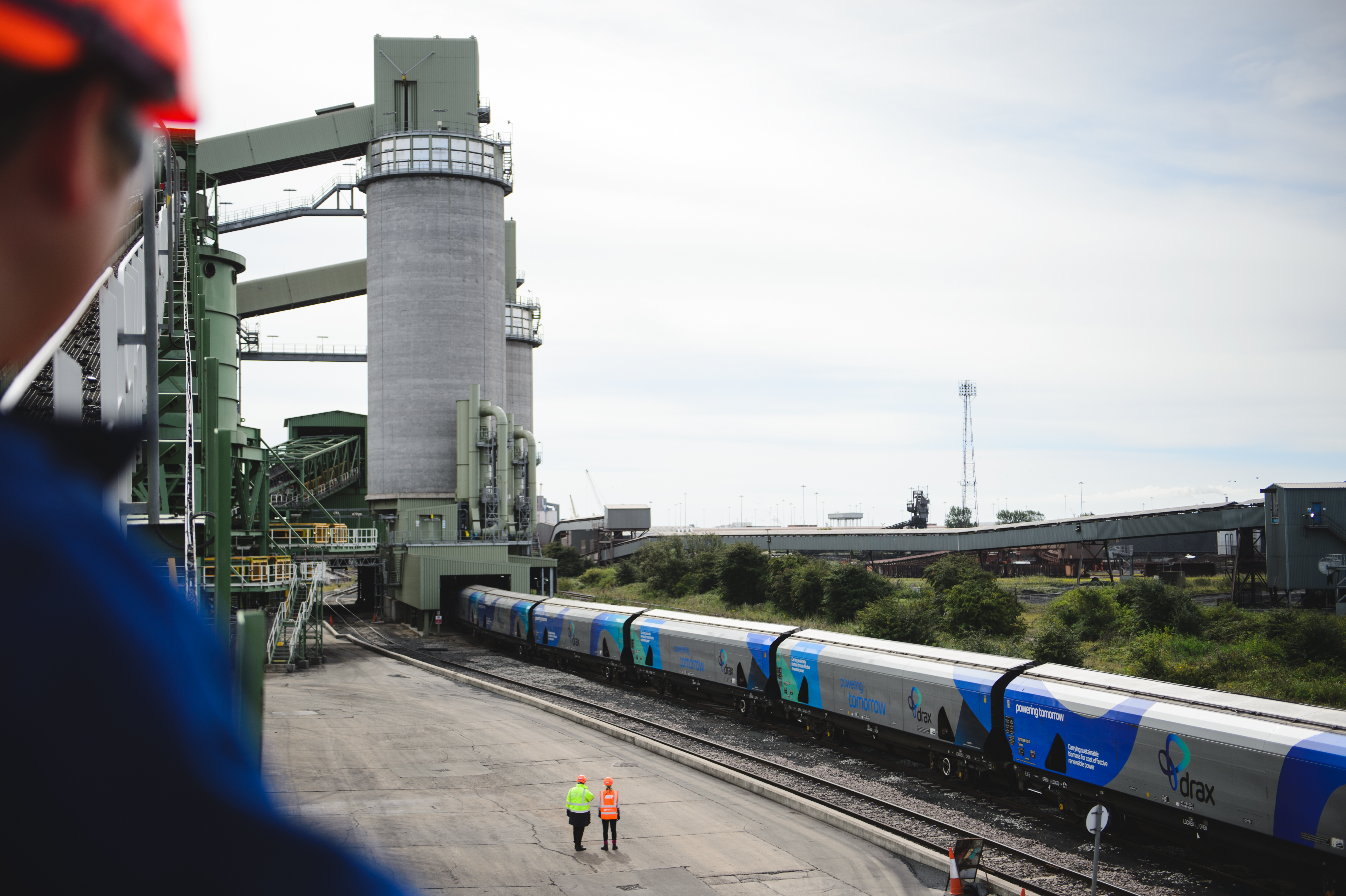
Since publishing its half year results on 19 July 2017, trading conditions in the markets in which Drax operates have remained in line with expectations.
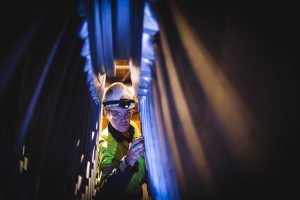
A major planned outage on the CfD(1) unit was completed in November 2017 and the unit has now returned to service. Both biomass and coal operations are currently performing well.

Retail operations remain in line with expectations, with the integration of Opus Energy progressing well and continued improvement in profitability at Haven Power.
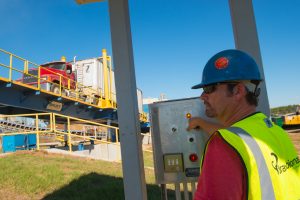
At the Morehouse and Amite pellet plants, the installation of a further 150K tonnes of capacity – allowing access to incrementally cheaper local wood residues – as part of the previously announced plans to optimise operations, is now complete.
The third pellet plant at LaSalle began commissioning in November 2017, with pellets now being produced and an increase in production scheduled through 2018.
Taking these factors into account and based on good operational availability for the remainder of the year, our expectations remain unchanged.
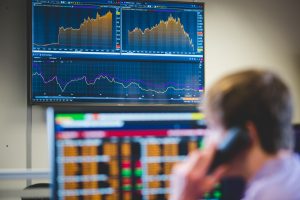
As at 7 December 2017, the power sales contracted for 2017 and 2018 were as follows:
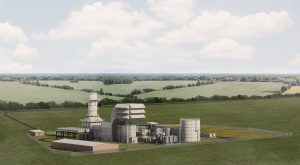
Drax continues to develop options for 1.2GW of new Open Cycle Gas Turbine (OCGT) capacity, providing peaking power and system support services to the grid. The first two projects – Progress Power and Hirwaun Power – will participate in the next capacity market auction in February 2018. Negotiations for engineering and construction contracts are progressing well, with competitive tenders received from a number of providers.
If developed, these projects would be underpinned by a fifteen year, index-linked capacity market contract, extending earnings visibility into the 2030s.
Drax also continues to develop options for its remaining coal assets, including further low cost biomass and coal-to-gas conversions, the latter of which is progressing through a public planning consultation.
Through these options for growth and improved earnings Drax continues its transformation, helping change the way energy is generated, supplied and used for a better future.
As part of its core market focus Drax completed the sale of BBE(3) to AMPH(4) in October 2017. Drax retains an equity holding in AMPH(4).
Drax will announce its full year results for the year ending 31 December 2017 on 27 February 2018.
Drax Investor Relations:
Mark Strafford
+44 (0) 1757 612 491
Drax External Communications
Matt Willey
+44 (0) 1757 612 285
Ali Lewis
+44 (0) 1757 612 165
Website: www.drax.com
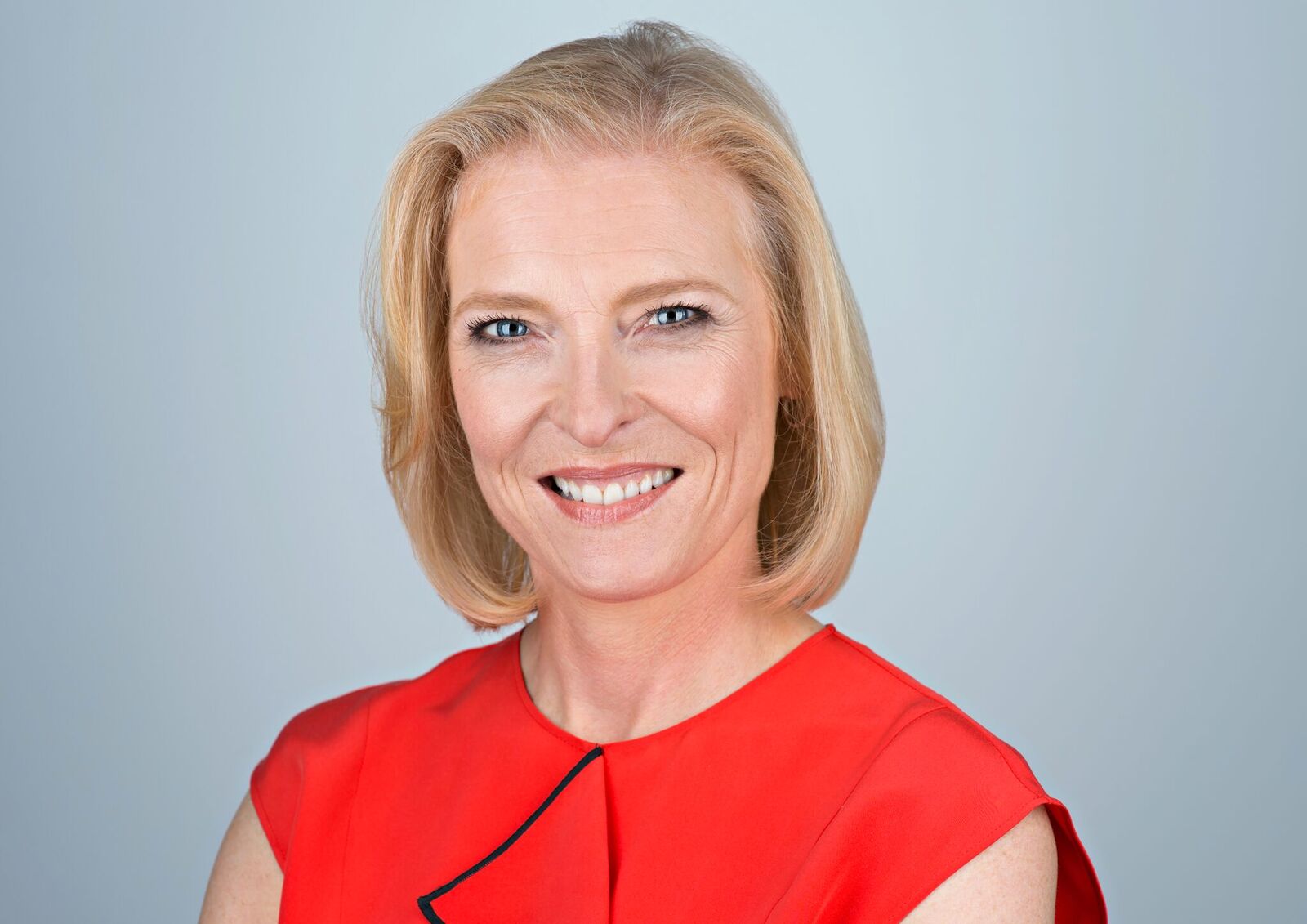
The Board of Drax Group plc (“Drax”) is pleased to announce that Nicola Hodson is to be appointed as a Non-Executive Director, with effect from 12 January, 2018.
Nicola served as a Non-Executive Director at Ofgem(1) between January 2015 and July 2017. She is currently Vice President, Global Sales and Marketing, Field Transformation at Microsoft(2), having worked with the company in various roles since 2008, including Chief Operating Officer of its UK business and leading its UK public sector business.
Prior to Microsoft(2) she held senior roles at Siemens, CSC, Ernst & Young and British Nuclear Fuels. She has also been a member of TechUK’s(3) Board since 2012 and was previously a board member of the UK Council for Child Internet Safety (UKCCIS) (4) and the Child Exploitation and Online Protection group (CEOP)(5).
Commenting on the appointment, Philip Cox, Chairman of Drax, said: “The directors are delighted to welcome Nicola to the Board. Her broad experience gained in the technology, business transformation, energy and consulting sectors, across a range of strategy, marketing and change roles will provide real value as Drax delivers on its strategy to help change the way energy is generated, supplied and used in the UK.”
Nicola added: “The energy sector is changing fast so this is an exciting time to be joining Drax’s Board. I believe Drax is well-placed to grow and support the decarbonisation of the UK economy through low carbon generation and fuel sourcing. I am particularly inspired by the prospect of joining a leading challenger-brand which puts customers at the heart of the business and allows them to maximise the opportunities presented by the emerging energy landscape.”
Nicola has also been appointed as a member of the Company’s Audit, Remuneration and Nomination Committees.
Drax Investor Relations: Mark Strafford
+44 (0) 1757 612 491
Drax External Communications: Matt Willey
+44 (0) 1757 612 285
Website: www.drax.com
END